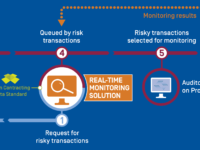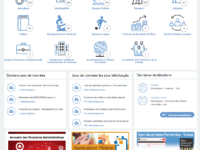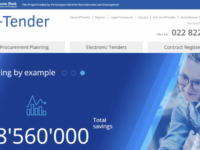The Anti-Corruption Digital Marketplace (MDA) is the first space developed by a public institution in the history of Mexico, in which public institutions can share free and ready-to-use digital tools, in order to streamline and promote innovation and cooperation among those that need either software, or other digital resources to achieve common goals in addressing corruption. The MDA contains more than 22 tools, some of them have been developed by other national or local level public…
Innovation Tag Opengov: integrity
The Reducing Friction in Trade (RFIT) project was initiated in March 2019 as a proof of concept to establish how blockchain distributed ledger technology and associated technologies can be used to seamlessly integrate supply chain data with HM Revenue & Customs and the Food Standards Agency’s systems. The project intends to do so by guaranteeing the timeliness and provenance of critical data and avoiding the need for discrete declarations.
The National Open Data Portal is a single access point for all data produced by public institutions for the purpose of :
- Complying with the provisions of the organic Law on access to information in its section on the proactive publication of public data in open format;
- Promoting the reuse of public data to stimulate innovation and the creation of new value-added services aiming to enhance the economic growth; and
- Strengthening the transparency and integrity of governmental activities.
Case Study
Libellula – a civic monitoring lab and a format to build and sustain a local civic monitoring…
Libellula is a laboratory for civic monitoring of local public spending and a format to build and sustain a local civic monitoring coalition. The first lab is based in Messina, Sicily. Moving from monitoring a specific case, Libellula aims at building a civic multi-stakeholder coalition which, while monitoring, simultaneously cultivates skills and capabilities of those involved to advocate for transparent and collaborative public spending in order to address the misuse of public money.
MTender is a revolutionary tool which will transform the way public funds are spent in Moldova, a country with a long history of corruption.
The world’s first fully digital public procurement system, MTender uses open data to manage every element of the public contracting system. This enables officials to do their jobs better, citizens to hold the government to account, taxpayers to get a better deal, and businesses to compete on a level playing field.
Case Study
Digital tools to monitor and predict risks in auditing Ukraine’s revolutionary online public…

Ukraine is transforming its public procurement system to bring public procurement into the open, so citizens get a better deal and government runs smoothly. EBRD has supported the Ukrainian government to develop a new legal framework, and to develop cutting edge tools which can process vast amounts of procurement data in real time. State auditors can now quickly & pre-emptively spot risks or inefficiencies in the system and address them. It is the first innovation of this kind in the world.
Citizens Connect is a civic tool that provides access to information and public services, to support effective service delivery by gathering feedback and highlighting issues which are of concern to Citizens to the relevant Government agency for timely resolution. The platform also serves as a portal for civic awareness, public service information, citizen reporting, inquiries, and advice. This initiative fosters accountability and transparency in public services.
The methodology of the “Brazil Transparency Scale” Survey consists of a checklist on 17 categories that cover all relevant aspects of the access to information regulation at the local level, the existence and functionality of the electronic Citizen Information Service (passive transparency), as well as the information disclosure of public funds, revenue, expenditure, public bidding, etc. (active transparency). The final evaluation score ranged from zero to ten.
East Africa has an urgent need for innovative accountability mechanisms, as many public services are inefficient and corrupt. SEMA helps to improve the quality of public service delivery, by gathering real-time citizen feedback and presenting this data in digestible formats. We use low-tech tools, such as custom-made hardware devices and interactive voice response technology, that help citizens from all backgrounds to have a voice in evaluating their public services.
Budget Monitor is a ICT tool of SAOG that promotes transparency,accountability,efficiency of public administration through increased citizen scrutiny. BM establishes two way communication with taxpayers:
1.provides sophisticated budgetary information by easy-to-interpret visualizations and dynamic graphs for free and
2.enables citizens to get involved in audit process by informing SAOG about deficiencies in public spending,providing recommendations and contribute to improved public service…





